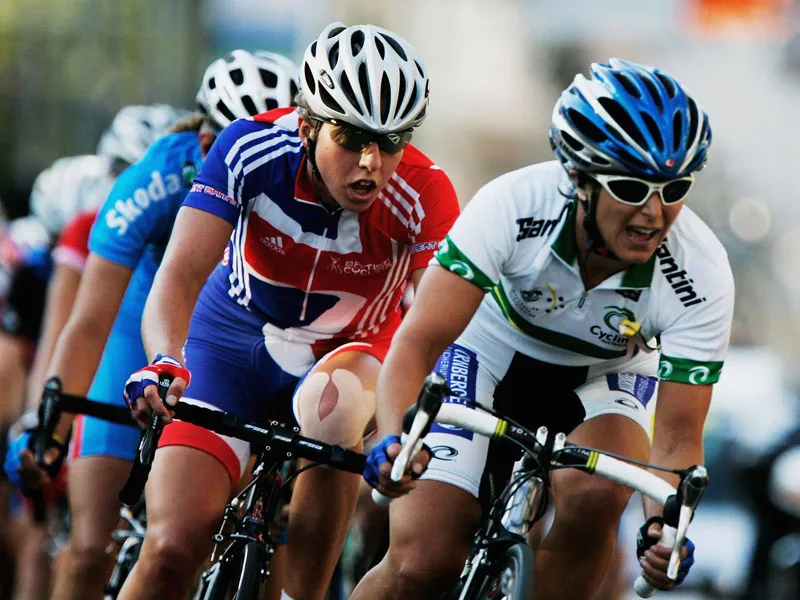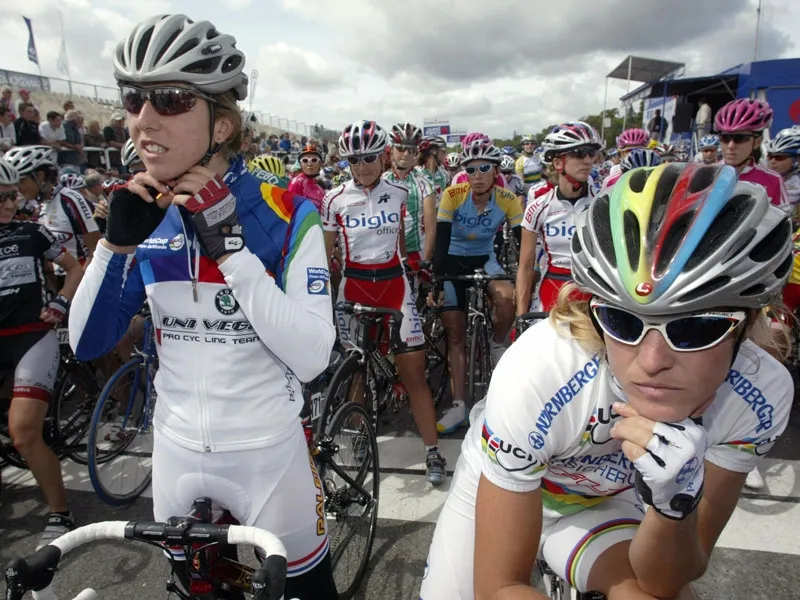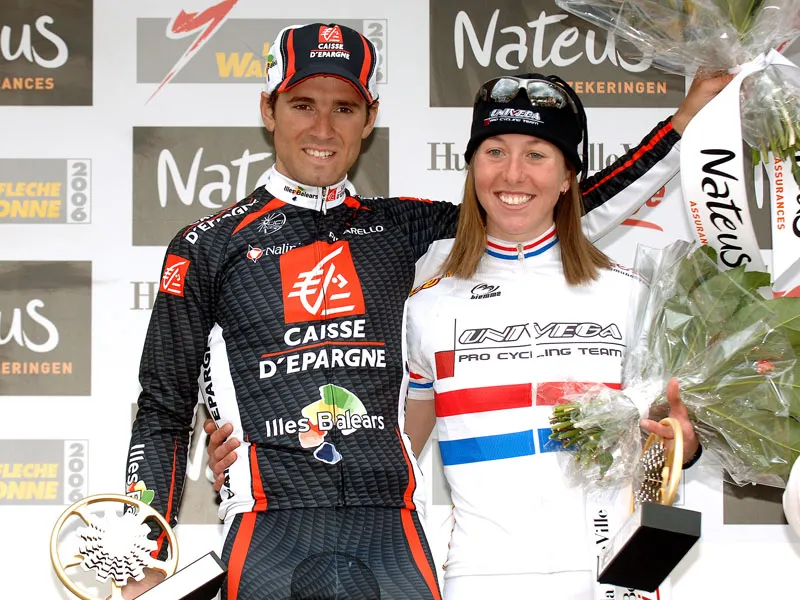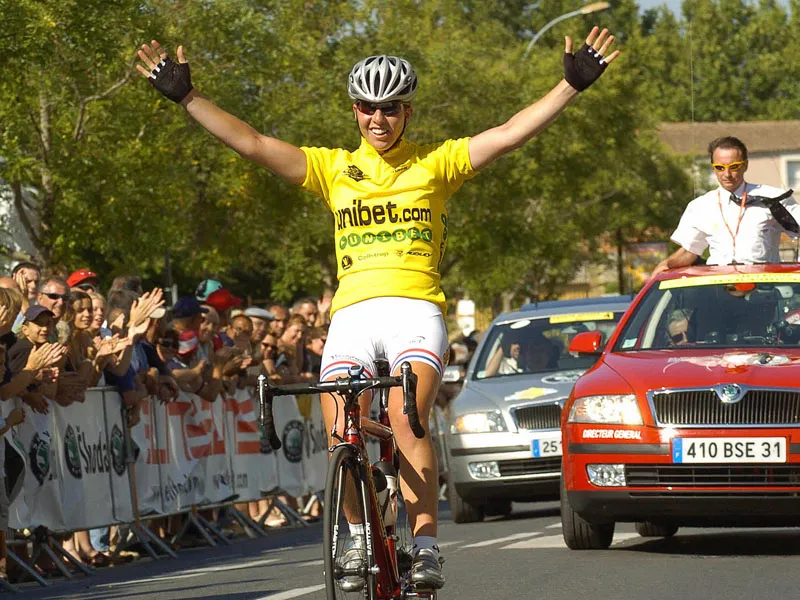Why doesn't Nicole Cooke like watching men's racing? And can she change the face of women's cycling, as Billie Jean King did in tennis?
Find out on the second part of our interview with Britain's top cyclist. See also part I: Olympic Dreams.
Doping
You don't have to talk to Nicole Cooke for long about doping to know where she stands on the subject. She has been exposed to it in her time (see this story in the Guardian) and is firmly against it. There are no weasel words and there's little in the way of diplomacy, especially when we talk about the problems of the men's side of the sport.
"I don't watch men's racing because none of them are people to me any more," she says with scorn and a little disillusionment. "I don't want to be taken in by them so if I watch a men's race I look at the technical aspects of it. Regardless of doping, that person's got a very good cadence and I like that. That person's got a great position on the bike and I like that. I can appreciate someone's fighting spirit.
"But I'm not going to ever have a male cyclist as a hero."

They're harsh words coming from a rider of Cooke's stature, who got into racing by following the Tour de France. But she's lucky. She has enough of her own fire now.
"I don't need to watch men's cycling to get my inspiration so I can leave it," she continues. "I get a lot of excitement from my racing. But for the person that lives their experiences through watching their heroes ... if you've been taken in and your hero did finally win or something, it would be an absolute shocker. I can understand what happens and where do you go from there?"
Detachment follows, even for the hard core fan. You could argue that's a good thing because athletes should not be given godlike status. But there's no denying that in addition to their entertainment value, they have the power to inspire people in healthy ways.
Cooke is well aware that cycling is a way of keeping fit and healthy. "But racing, you sign up to the rules of cycling to race," she stresses. "I really think if anyone chooses to compete then they need to agree to the whole reasons of that sport."
Those who break the rules will get no sympathy from Cooke. If she had her way, the punishments would be much tougher and across the board: "People who say that life bans are unfair, well, no they're not. You can go and ride your bike still. No-one's stopping you from doing that. You can lead the life you want to lead but don't come into our world of sport."
Nicole is fortunate in another way, that her world of sport is not nearly as tainted by doping as men's professional cycling. There are exceptions: Canadian Genevieve Jeanson, who won several world cup races and dominated the women's scene in America before retiring at age 24, recently confessed to using EPO since she was 16. Jeanson beat Cooke to win the 2003 Montréal World Cup.
Whether doping in women's cycling will increase as the sport grows is an unanswered question. At the moment, the harder battle for riders like Cooke is to improve the status of their chosen profession.
Women's cycling

Women's racing is boring, it's slow, it's negative and there is no depth. It's a criticism that's often levelled at that side of the sport. But if you ask Nicole Cooke, things have changed a lot.
"In cycling the women's races are just as exciting as the men's races," she says with conviction as we turn to that topic. "There's no reason for them not to be. It's just prejudice towards the men's side of cycling."
Cooke is in a good position to judge, after all. She's often spearheading attacks off the front of the women's peloton, making for an exciting spectacle for those who are fortunate enough to watch. But it's hard to overcome prejudice, especially if you're a woman in a male-dominated sport.
Tennis is probably the best example of where things are well balanced between the sexes. Men and women compete for equal prize money at nearly all the major tournaments, and few would argue that women contribute a lot to the sport. The shift towards equality happened 40 years ago: "In tennis it was people from the inside - Billie Jean King - who brought it forward," says Cooke. "She had a lot of people and negativity get in her way from the women's tennis scene. 'Why change it, it's been like that?' they said.
They can't do a Madison, they'd all fall off!
"I remember in 2005 when the 500 metre time trial and the kilo were taken out of the Olympics, there were petitions, bring back the kilo, bring back the 500. Someone asked me my point of view on it. I said I'm more concerned that there are more men's events than women's events at the Olympics, so if you ask me I'm going to start a petition that says 'Let's not have eleven medals for men and seven for women, let's have eight-eight.' That was my point of view at the time.
"I wrote to Pat McQuaid [International Cycling Union president] and it didn't do a thing. There was nothing there. Even within the women's forum that the UCI had created, they were very dismissive of it. They said 'Well, what events could you put on for the women to take it up there? They can't do a Madison, they'd all fall off!'
"That's a little bit the chicken and the egg. What happened when they had an Olympic Sprint? That hadn't been there for ever but the countries realised that it was an Olympic and a world medal, so they trained it and within a year they had riders that could do an Olympic sprint."
Unfortunately, the women's representation at the UCI fell apart at the end of 2005. "It wasn't very well supported by the UCI," says Cooke. "The riders who put the effort in realised that it was for nothing. I think the things that Billie Jean King went through I can fully understand."
Despite this, Cooke thinks that women's cycling is starting to come of age: "The number of teams registered with the UCI went from 26 to 41 last year, so that's a massive step forward. The media is starting to cover women's cycling so people get to know the personalities involved, so that's a big improvement. Eurosport are showing more women's world cups on television, which they haven't done in the past, so there are big strides forward there. I think the competitiveness is continuing to improve. There's a lot of strength and depth in the races now, and you can have three races on the same weekend. Things really are improving and I think they will continue to."

Cooke has a few ideas that would help to push it even further.
"The simplest thing would be for the UCI to say that every organiser of a men's race should put a women's race on. That way you're joining up the men's and women's racing. There's the same press people there for both races. The crowds can see men's racing and women's racing so it's going to have more appeal. I think with that extra appeal the sponsors and everything else will follow in terms of developing the sport. More people will see the racing, more women will get involved, the competition will increase as well."
This already happens in high profile events such as La Flèche Wallonne, Ronde van Vlaanderen and GP Plouay, and up until recently there was a women's version of Milan-San Remo. Could we see a women's Paris-Roubaix, Liège-Bastogne-Liège and Giro di Lombardia in future? Or a even return of a women's Tour de France run at the same time as the men's? It would take the UCI and the major race organisers to agree on something, and they haven't been good at doing that lately.
Going hand-in-hand with the racing are joint men's and women's teams. "Teams like T-Mobile have got a women's squad and a men's squad running together," says Cooke, who is one of the key members of the new British Cycling professional team that will feature a mix of men and women. "There could also be a way of the UCI encouraging other male pro teams to incorporate a women's team to bring women's and men's cycling onto a more even standing."
The above are part of Cooke's vision for women's cycling, but there's more: "The rankings at the end of the year could be on combined results, not just men's or women's. There's enough variety in the cycling year of having a ProTour that consists of grand tours, one day races and small stage races. Why not include the women's races in it? It's a young thing, the ProTour, so it's not as if we're changing something that's been in place for decades."
I think we're seeing now that brand quality counts for a lot more
For all this to happen, sponsors have to get behind women's cycling. At the moment, so-called professional women's cyclists get paid a fraction of that of their male counterparts. Plenty don't get paid at all. Team budgets - of the order of €100,000 at the top level - are barely enough to cover expenses, let alone rider salaries.
Nicole is one of the lucky few, being good enough to attract a reasonable salary and external sponsorship because of her status at the top. EAS nutrition are one of these sponsors. "They've been very supportive of me since 2004," says Cooke, who emphasises a point: "It's fantastic to be working with a company that provides great nutritional products but can say that all of its products are guaranteed to be doping free. It's good to think carefully about what company and brands you want to associate with."
Cooke thinks that sponsors are paying more notice to their image nowadays, beyond just wanting wins. "The head of Rabobank standing up and saying that Rasmussen is degrading our brand quality - that shows she doesn't want column inches or headlines, she wants clean, she wants quality. I think that Festina didn't really care when their doping scandal came because they got to see their name in the press. They were watches, they didn't really worry that much. I think we're seeing now that ten years on that brand quality counts for a lot more."
It might take another ten years to change the sport in the ways Cooke suggests. It might not happen at all. But if it does, the Nicole Cookes of this world won't be the only ones to benefit.
See also part I, where Nicole talked about her ambitions for the Olympics and how she was going about achieving them.


